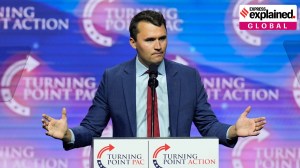US economic growth expected to slowdown further in 2001
NEW YORK, JAN 2: The US economy is expected to grow at a relatively sluggish pace this year, following one of the most spectacular and vol...

NEW YORK, JAN 2: The US economy is expected to grow at a relatively sluggish pace this year, following one of the most spectacular and volatile years for the economy in decades, then slowed abruptly in the second half, Tuesday’s Wall Street Journal reported.
Meanwhile, US Treasury Secretary, Lawrence Summers said he expects `moderate’ economic growth in 2001, and argued federal debt reduction is crucial to economic health because it `really functions like a tax cut.’
The argument Summers made on `Fox News Sunday’ runs counter to positions held by President-elect George W Bush as he develops an economic policy with tax-cut promises at its core. Bush and other Republicans, citing stock market slowdowns, rising interest rates and oil prices, have argued the economy is slackening and say significant across-the-board tax cuts could help ward off any slide toward a recession.
Democrats accuse the GOP of tailoring pessimistic projections to help promote a $1.3 trillion package of tax reductions. Summers said many economists forecast moderate growth through next year. While that will be cooler than the hot-running economy of early 2000, `that was inevitable,’ he said. “I think it’s a proven fact that by showing that we can pay down debt in the long run, we increase confidence in the markets,” Summers said. “That reduces long-term interest rates, pulls down capital costs, brings about more investment, which in turn produces more growth and more prosperity.
“So I think it is absolutely crucial that we keep a focus on the importance of debt reduction in the long run.” Debt reduction versus tax relief was a familiar debate between Democrats and Republicans in the 2000 election. Bush’s tax proposal relies on using a portion of projected surpluses; rival Al Gore and other Democrats argued that should be used to pay down a national debt of $5.6 trillion, $3.4 trillion of which is held by the public. Bush has planned an economic forum for midweek in Texas to discuss his belief that the nation’s economy is showing signs of trouble.
Meanwhile, business activity in the nation’s manufacturing sector resumed its slowing trend, according to APICS, an industry trade association. The APICS business-outlook index fell to 45.7 per cent in December from 54.9 per cent in November.
The APICS business outlook was created by economist Michael Evans for the Educational Society for Resource Management, formerly the American Production and Inventory Control Society. It was the last APICS report to be released because the group has decided to discontinue the data series.
The decline brings the index near its lowest point for the year – it hit 44 in June – indicating that the manufacturing sector is continuing to cool. A reading above 50 denotes growth while a below-50 reading denotes contraction. The news is the latest in a string of reports that depict an economy slowing more sharply, and more quickly, than anticipated. The cooling economy has led the Federal Reserve to formally identify slower growth, not inflation, as the biggest current threat to the economy, and analysts expect the central bank to begin cutting interest rates next year to spur growth. The business-activity slowdown was broad-based and included decreases in shipments, job creation, production and future expectations.
Photos





- 01
- 02
- 03
- 04
- 05


























